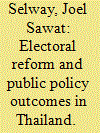| Srl | Item |
| 1 |
ID:
102706


|
|
|
| 2 |
ID:
102713


|
|
|
|
|
| Publication |
2011.
|
| Summary/Abstract |
How do changes in electoral rules affect the nature of public policy outcomes? The current evidence supporting institutional theories that answer this question stems almost entirely from quantitative cross-country studies, the data of which contain very little within-unit variation. Indeed, while there are many country-level accounts of how changes in electoral rules affect such phenomena as the number of parties or voter turnout, there are few studies of how electoral reform affects public policy outcomes. This article contributes to this latter endeavor by providing a detailed analysis of electoral reform and the public policy process in Thailand through an examination of the 1997 electoral reforms. Specifically, the author examines four aspects of policy-making: policy formulation, policy platforms, policy content, and policy outcomes. The article finds that candidates in the pre-1997 era campaigned on broad, generic platforms; parties had no independent means of technical policy expertise; the government targeted health resources to narrow geographic areas; and health was underprovided in Thai society. Conversely, candidates in the post-1997 era relied more on a strong, detailed national health policy; parties created mechanisms to formulate health policy independently; the government allocated health resources broadly to the entire nation through the introduction of a universal health care system, and health outcomes improved. The author attributes these changes in the policy process to the 1997 electoral reform, which increased both constituency breadth (the proportion of the population to which politicians were accountable) and majoritarianism.
|
|
|
|
|
|
|
|
|
|
|
|
|
|
|
|
| 3 |
ID:
102710


|
|
|
|
|
| Publication |
2011.
|
| Summary/Abstract |
his article explores the origins of peak employers' associations to understand why countries produce highly centralized macrocorporatist groups, weaker national associations but stronger industry-level groups, or highly fragmented pluralist associations. The authors suggest that the structure of partisan competition played a vital causal role in the development and evolution of these peak associations. The leadership for peak employers' association development came from business-oriented party activists and bureaucrats, who sought both to advance industrial development policy and to solve specific problems of political control. Business-oriented party leaders and bureaucrats in both predemocratic and democratic regimes feared the rising tide of democracy and labor activism and viewed employer organization as a useful tool for political control, to secure parliamentary advantage, and to serve as a societal counterweight to workingclass activism. Because leadership for association building came from the state, the political rules of the game were crucial to outcomes. The structure of party competition and state centralization shaped incentives for strategic coordination for both political actors and employers. Dedicated business parties were more likely to develop in countries with multiparty systems and limited federal power sharing than in countries with two-party systems and federalism: in a multiparty context where no single party was likely to gain power, each party had an incentive to cooperate with other social groups. Moreover, business-oriented party leaders and bureaucrats in multiparty systems were motivated to delegate policy-making authority to coordinated societal channels for industrial relations, because they anticipated that employers would win more in these channels than in parliamentary settings where the center and left could form a coalition against the right. Again, centralized party systems were more likely than federal ones to develop a dedicated national business party that transcended regional cleavages and to retain a strong role for the state in the governance of industrial relations.
|
|
|
|
|
|
|
|
|
|
|
|
|
|
|
|
| 4 |
ID:
102712


|
|
|